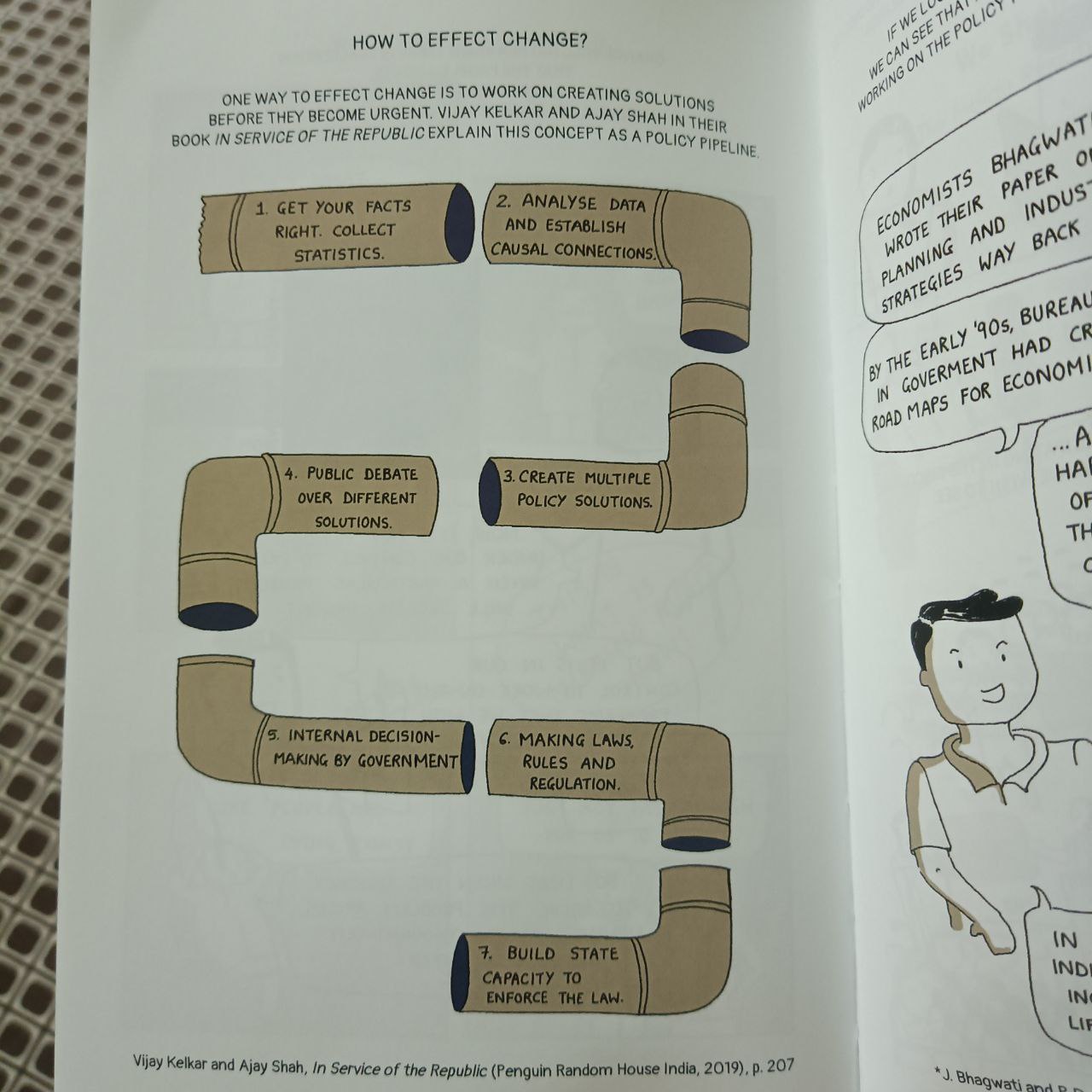
“No one can define or measure justice, democracy, security, freedom, truth, or love. No one can define or measure any value. But if no one speaks up for them, if systems aren’t designed to produce them, if we don’t speak about them and point toward their presence or absence, they will cease to exist.”
— Donella Meadows, Thinking In Systems: A Primer
I recently bought this book which is a graphic explainer in the style of a zine. It explains how the interplay between the state, market and society affects all of us and how we, the Indian citizens can play a part in it.In short, it talks about all the things that you love to have an opinion on but don’t put enough thought into. I don’t mean to roast you alone. I was like that too, and to some extent, I still am. Don’t believe me? Do you have a clear, first-principles answer to all these questions? Make sure you aren’t repeating someone else’s opinion on this and that you have deeply thought through the implications of your answers:
- What really is a republic? How does it differ from a democracy? Why does it matter that India is a republic? What should the State provide to its citizens? What should it leave to the markets? What does the market provide to the citizens? What properties does the market afford on society? What are all the tools, incentives and levers that the states, market and society have to create positive change? Which policy levers must we pull for what situations?
Understanding this crazy complex and dynamic system called India is hard stuff. But there are some fundamental things that everyone can understand—and knowing these things will help you be a well-informed agentic citizen, as opposed to a passive nihilistic whiny chump who complains about how everything sucks (without enough empathetic insight into why things suck).
In fact, these fundamentals can be explained quite succinctly in the form of a comic book that an 11-year-old can understand. I love that this exists.
(A cartoonist, a policy expert and an economist walk into a bar. They write a book that is neither boring nor cringe. It’s actually amazing. What.)
Here are some poorly lit excerpts I enjoyed. Maybe you’ll get a feel for why I liked this book.
I liked this bit because of how succinctly it presents the big flaw of democracy.

I love these two pages because I can personally relate to them. I happen to work with a non-profit that makes software for managing cardiovascular disease at scale1. The one thing I definitely noticed is that public sector units are thirsting for resources and quality staff like a dehydrated fellow stuck in the Atacama desert.


Nothing particularly special in this part. I just happen to be a sucker for the Sisyphus myth. There used to be a time when it used to weigh on me a lot more.

Why free markets are so powerful.

In contrast, here’s one of many ways that show why markets suck. I love how they summarised Akerlof’s “The Market for Lemons” in one page.

All the things that Governments (generally) do. The chapter goes on to explain everything in the neta’s jacket and neatly ties all of these tools together in a crisp 2-axis chart. Great stuff.

How to change things. A nice thing about this book is all the citations that point to other interesting work in policy-making and economics.

I do have one small criticism of this book. The authors couldn’t resist adding a joke or two about the culture wars that are present in India. There are a couple of boomer uncle caricatures who go around calling people anti-national and insisting that everyone stand up for the national anthem.
Why is this a problem?
There’s a blurb at the back of the book by Ajay Shah that says this:
“[…] Everyone who is interested in India should buy this for their WhatsApp Uncle”
I strongly disagree with the blurb. Ironically, the inclusion of this blurb at the back perfectly demonstrates why this book will not be persuasive to the WhatsApp Uncle. It simply alienates them and makes them the butt of jokes, instead of trying to get them to understand the nuances of policy. Even if they are a lost cause, they are part of the system. One would hope that all the WhatsApp uncles who run our educational institutions don’t notice this stuff and exclude this book from school libraries.
Anyhow, by the end of the book, I felt like I had read a graphic novel instantiation of one of my favourite books, Donella Meadows’ Thinking In Systems—our society is nothing but the beats of a large, dynamic system of goals, levers, feedback loops and information flows. And the book plainly lays this all out in front of the reader. I am really impressed by the amount of nuance they could capture with the format. Props to the authors for that.
This piece was originally published in Atharva’s personal blog.
footnotes
-
A really interesting systems thinking problem by the way. Much like the stuff talked about in this book, solving cardiovascular health at scale is setting up the right feedback loops and pulling the right levers in a dynamic system! ↩

